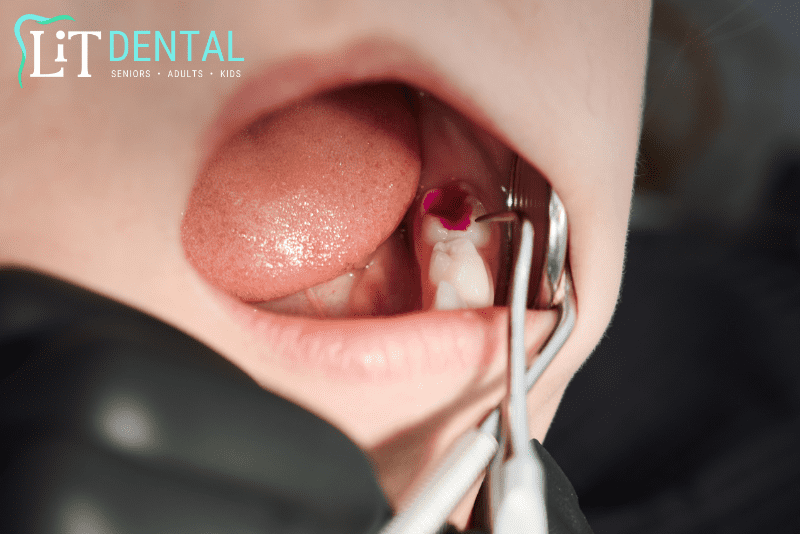Pain in your teeth is your body’s signal that something is wrong. Ignoring a toothache can result in major dental issues, whether it’s a mild aching, a sharp sting when you chew, or a chronic throb that keeps you up at night. A deep infection that can necessitate root canal therapy is one of the most frequent causes of excruciating tooth pain.
At Lit Dental, we provide accurate diagnosis and assistance in identifying the early warning signals that a root canal is necessary. This blog will provide you with the information about the signs you need a root canal and how to proceed if you’re unsure if you require a root canal or not.
8 Common Signs You Need a Root Canal
You can preserve your tooth and avoid other issues if you know what to look for. The following are the most typical warning indicators:
- If you experience dull or acute tooth pain that doesn’t go away when you take painkillers, it can be a sign of pulp injury.
- After being exposed to hot or cold meals or beverages, sensitivity that persists for more than a few seconds is frequently an indication of nerve involvement within the tooth.
- A tooth’s surrounding swelling, particularly if it’s red or uncomfortable to the touch, may indicate an abscess brought on by an infected root.
- A tooth that becomes dark or gray could be dying as a result of pulpal trauma or infection.
- The root canal system may be inflamed if the tooth feels sensitive or painful when you bite down or apply pressure.
- Bacteria can enter the pulp chamber through very tiny cracks. Get your teeth checked out right away if they feel uncomfortable after chipping.
- As the surrounding bone and tissues deteriorate, an infected tooth may come free. This is a severe red flag.
- A persistently unpleasant taste in your mouth, particularly accompanied by swelling. It may indicate that pus is dripping from an infected tooth.
What Is Root Canal Treatment?
It is a common dental process used to treat infections deep within the tooth. The pulp, which houses blood vessels and nerves, is located in the middle of each tooth. This pulp cannot cure itself when it becomes infected by decay, trauma, or cracks; if treatment is not received, the infection may spread.
The dentist cleans the tooth from inside, closes it, and extracts the pulp from the infected area during a root canal process. The goals are relief from pain, prevention, and maintaining your natural tooth.
Which Factors Lead to Pulp Infection?
Several factors may lead to infected tooth pulp, such as:
- Deep untreated cavities
- Multiple dental procedures on the same tooth
- Broken or cracked teeth
- Impact or trauma
- Gum disease that permits the pulp to become contaminated
Knowing these factors helps you to take precautions, but identifying the symptoms that indicate a root canal is even more essential for proper treatment.
Why Is It Important To Take Immediate Action?
In the hopes that the pain will subside, many people postpone visiting the dentist. Waiting just makes an infected tooth worse day by day. Serious health problems can result from an infection that spreads to your teeth, the jawbone, or even into the blood flow.
You can prevent such issues by identifying the signs early and choosing root canal therapy as soon as possible.
- Loss of teeth
- Bone injury
- Extractions in an emergency
- extensive restorative operations
- Systemic Infections
Step-by-Step Process of Root Canal Therapy
Many patients are surprised by the ease and simplicity of contemporary root canal therapy. Especially when qualified specialists perform it.
Here’s what happens during the procedure:
- To make sure the surgery is painless, a local anesthetic is used to numb the area around the diseased tooth.
- This stage involves making a tiny hole and carefully removing the diseased pulp.
- After sanitizing the canal to get rid of any remaining bacteria, the next step involves giving it a thorough cleaning and shaping.
- The next step involves filling the canal with biocompatible material and sealing it completely with a filling.
The majority of patients report feeling significantly better after the procedure. It typically takes one to two sessions.
Why Do You Need to Consult with a Certified Dentist?
Experience is important when it comes to root canal treatment. A licensed, accredited root canal dentist guarantees that:
- To avoid needless therapy, appropriate diagnostic tests are utilized to confirm infection.
- To avoid more problems, sterile procedures are used.
- Modern tools and materials provide outcomes that last.
- The chance of reinfection is reduced when the operation is performed correctly the first time.
- The comfort and safety of patients come first.
We at Lit Dental take pride in being a professional McKinney dentist with a solid reputation for restorative dentistry on weekends as well. Our team adheres to the strictest guidelines for infection prevention, clinical treatment, and patient knowledge. Moreover, we are accepting all insurances.
Select a dental clinic with experience to safeguard your long-term oral health rather than entrusting your smile to hunches or shortcuts.
Restore Your Confidence with Our Restorative Dentistry!
Rebuild. Repair. Renew.
- Natural-Looking Dentures
- Painless Root Canals
- Long-lasting Implants

Conclusion:
Ignoring dental issues or assuming they will go away on their own can cause expensive treatments and major problems. When the inner tooth becomes infected, root canal treatment is a secure, efficient, and less painful solution.
It’s time to make an appointment for an examination (972) 369-7811 or LitDentalClinic@gmail.com if you’re going through any of the symptoms related to teeth. Your chances of keeping your natural tooth and avoiding more intrusive operations are better the earlier you take action.




